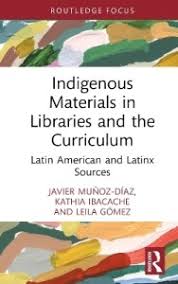2018 School Spending Survey Report
Indigenous Materials in Libraries and the Curriculum: Latin American and Latinx Sources
Routledge.
(Routledge Focus).
Apr. 2024.
100p.
Tr $64.99. ISBN 9781032618494.
COPY ISBN
 This title calls readers to take a decolonizing approach toward library collections and their distribution, noting that the university library is often a site that maintains Eurocentric extraction and objectification patterns from which educators, researchers, and students learn and create new knowledge about Indigenous people, particularly those from Latin America. Instead, the authors call for centering the languages, literacies, and creative literary and media work of Indigenous people to build and expand awareness of their epistemologies or ways of knowing. The goal goes beyond simply increasing the quantity of materials produced by Indigenous people in collections; it is also to analyze library systems, distribution processes, and reception or engagement efforts to identify the colonizing cultural and epistemological values these uphold. To do this, the authors present ways to build bridges and increase networks among academic librarians, faculty, students, and Indigenous communities. These include examples of faculty/librarian collaborations to build physically and digitally inclusive collections, recommendations for text selection criteria, and ways to catalog collections that link to broader social networks and small publishing companies. All of this allows for easier search processes, identification, and location of these materials to create new knowledge with, rather than for or about, Indigenous people.
This title calls readers to take a decolonizing approach toward library collections and their distribution, noting that the university library is often a site that maintains Eurocentric extraction and objectification patterns from which educators, researchers, and students learn and create new knowledge about Indigenous people, particularly those from Latin America. Instead, the authors call for centering the languages, literacies, and creative literary and media work of Indigenous people to build and expand awareness of their epistemologies or ways of knowing. The goal goes beyond simply increasing the quantity of materials produced by Indigenous people in collections; it is also to analyze library systems, distribution processes, and reception or engagement efforts to identify the colonizing cultural and epistemological values these uphold. To do this, the authors present ways to build bridges and increase networks among academic librarians, faculty, students, and Indigenous communities. These include examples of faculty/librarian collaborations to build physically and digitally inclusive collections, recommendations for text selection criteria, and ways to catalog collections that link to broader social networks and small publishing companies. All of this allows for easier search processes, identification, and location of these materials to create new knowledge with, rather than for or about, Indigenous people.
VERDICT A crucial title for all academic libraries; this should be required reading in graduate library science, education, and higher education programs across the U.S.
ALREADY A SUBSCRIBER? LOG IN
We are currently offering this content for free. Sign up now to activate your personal profile, where you can save articles for future viewing





Be the first reader to comment.
Comment Policy:
Comment should not be empty !!!